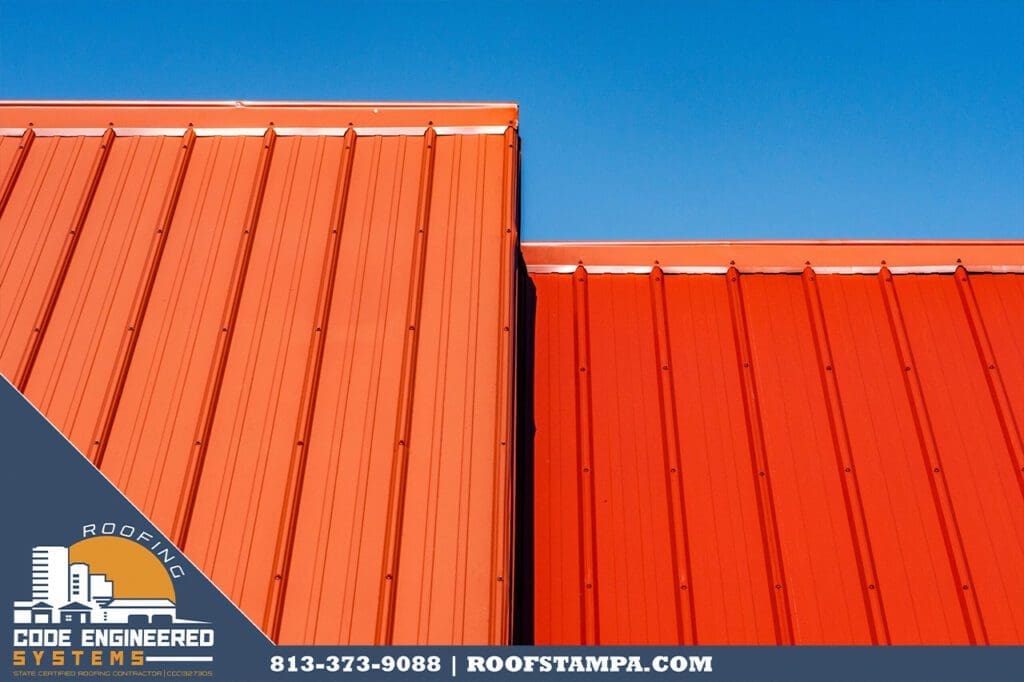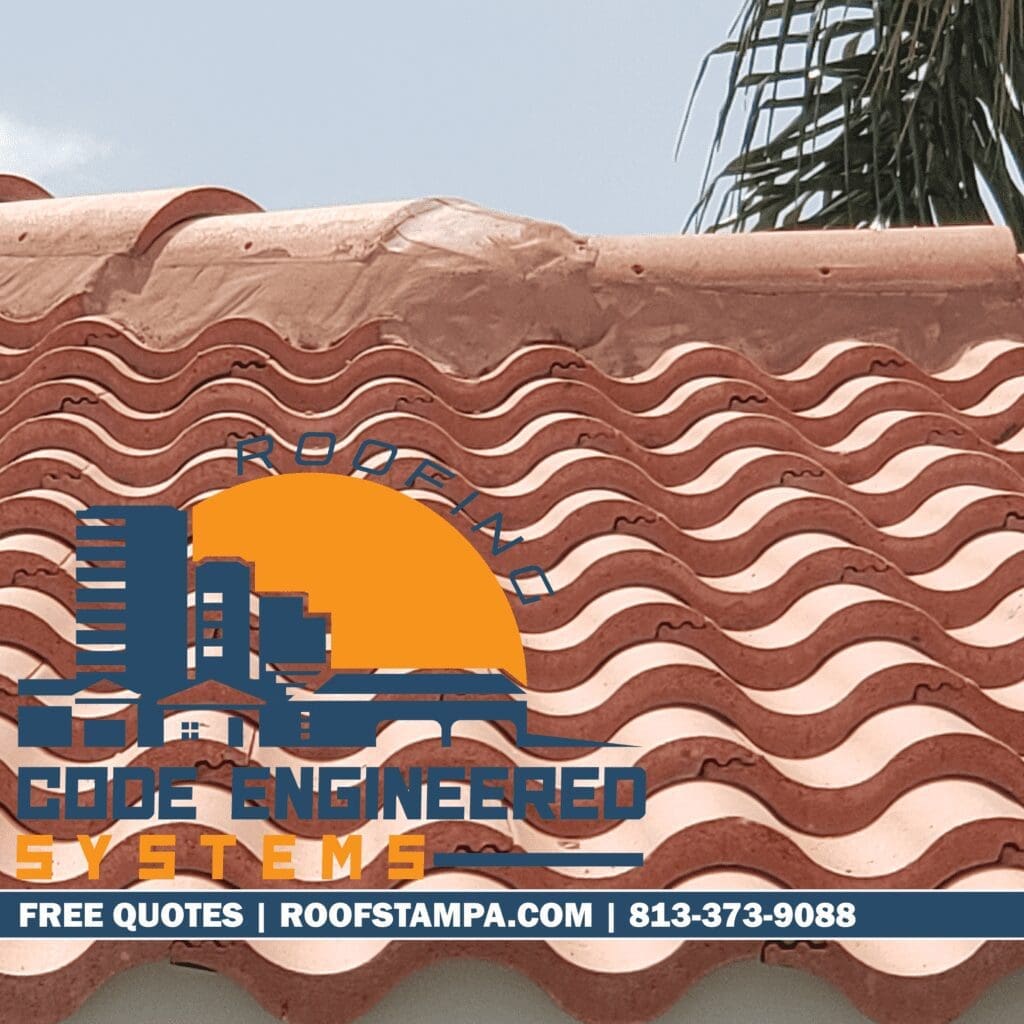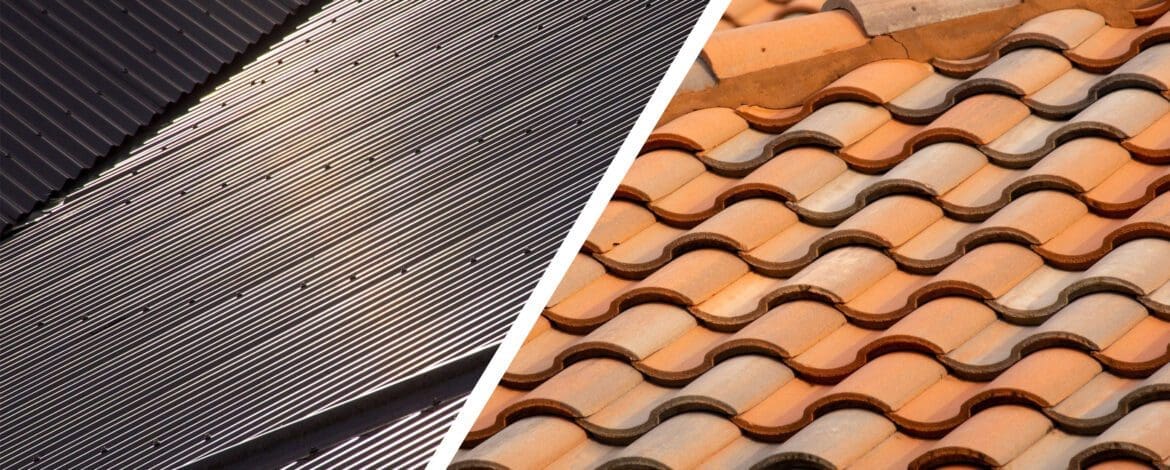Asphalt shingle roofs are the most popular roofing material in the U.S. They’re usually the least-expensive option, but definitely not the longest lasting. That distinction goes to metal and tile roofs. Okay, slate is also in that category, but it’s at another level of cost, and so it’s an uncommon choice in most of the nation. So back to metal and tile roofs. Both are considered to be an upgrade option over asphalt roofs. They cost more, but may be a “lifetime” roof for you, depending on your age. So what is the lifespan of a metal roof vs a tile roof?
Metal Roof Lifespan
The material choices include steel, which is the most common, aluminum, Galvalume, copper, and zinc. The different forms include exposed-fastener sheets, concealed-fastener sheets, and tiles. You’ll find some distinctions among those choices, and they do matter. Top-fastened sheets will give you the lowest cost and probably the shortest longevity. They are still a solid choice that will last longer than asphalt shingles for a minor bump in price. When you look at the options with concealed fasteners, now you’re looking at a lifetime roof! And metal tiles will give you a lifetime roof with something closer to the look of tiles.
Exposed-Fastener Steel Sheets
Some people call this “barn roofing.” It is often used on pole barns, horse barns, and warehouse-type structures that don’t need weather-tight living quarters. That said, it is perfectly capable of being kept weather tight. In exchange for its low cost, it does requires a bit more maintenance than metal tiles and concealed-fastener sheets. Since the screws are driven through the exposed face of the sheets, and they include a rubber washer to seal out water, this type of roof needs to be checked periodically. It’s typical for the screws to need re-tightening occasionally.
In northern Florida, the occasional frost does cause a bit more material contraction than is typical in most areas of Florida. That contraction affects the screw/washer connection with the roof. In the Tampa area, however, we are more concerned about high winds and pummeling rains. This type of roof handles our weather quite well, but you should plan to keep an eye on your roof after heavy storms. That goes for any type of roof, actually.
As with any roof in Florida’s challenging climate, a yearly roof check is the minimum, and is cheap insurance. It’s also a good idea to simply take 15 minutes once every couple of weeks to have a look at your roof, and the rest of your home as well.

Lifespan of Exposed-Fastener Sheets
You can expect your new exposed-fastener steel roof, installed by experienced professionals, to last more than 30 years. Clearly the major risk is a hurricane. That event may damage your roof, but take heart in knowing that a storm that damaged your steel roof would probably have destroyed a shingle roof. This type of roof is readily repairable. More so than asphalt shingle roofing, in fact, so any storm damage is less likely to require a full replacement.
Concealed-Fastener Sheets
With this type of roofing, you will get a clean and more esthetically appealing roof than most types of roofing. You’ll see a continuous expanse of the roofing material from eave to ridge, with just the few pipe penetrations here and there.
So what material to choose? We’ll be honest and say that they’re more similar than different. Steel is strong and readily available, but can rust over the decades. Aluminum is not as strong as steel, so it will dent more easily, but will never rust. It’s more expensive, too—80-100% over steel. Galvalume is a steel substrate with an aluminum and zinc coating. It’s impressive for corrosion resistance, stronger than aluminum, and costs less. Copper is a high-end choice, expensive, doesn’t rust, and beautiful. But it’s available in that one color choice, and will develop the verdigris patina over time. You either like it or you don’t. Zinc is as good as anything but not widely available in the U.S. And it’s expensive, at $10-20/square foot, installed.
Lifespan of Concealed-Fastener Sheets
Galvalume will provide the shortest lifespan in a coastal area, and will not carry a manufacturer’s warranty for structures within 1500 feet of the coast. In a non-coastal installation, Galvalume is warranted for 25 years. Aluminum, since it simply does not rust, can last longer, more than 40 years. Copper and zinc last longer yet; possibly 80-100 years!
Concealed-Fastener Metal Tiles
Metal tiles are an interesting hybrid of the look of traditional clay tiles, slate tiles, or wood shingles made from lightweight metal. You don’t have to upgrade the roof framing to go from asphalt shingles to metal tiles, as you do with clay or concrete tiles. It’s possible that this is the best roofing system available today. That partly depends on the appearance that you prefer. If you like the look of wood shingles, this is your best bet.
Lifespan of Concealed-Fastener Tiles
Metal tiles are available in both steel and aluminum, and some will carry a lifetime warranty on the materials for the original purchaser. The roofer provides the warranty on the installation, which highlights the importance of using the best contractors for home projects. Even without a lifetime warranty, steel tiles should last more than 30 years and aluminum tiles more than 40 years.
Traditional Clay Tiles
Here’s that classic “Old-World” look found in Europe, Latin America, and China for thousands of years. There’s a reason they’ve been popular for so long: they can last 100 years! Clay tiles are available in different profile shapes, such as flat, fish-scale, and “S-shaped”. Those shapes can give a different appearance. Clay tiles are also available in many colors, such as gray and terra cotta. The color is intrinsic to the clay, and they don’t exhibit efflorescence that affects concrete tiles.

Concrete Tiles
Concrete tiles are a relatively new application for concrete. The material, however, is the same durable, simple product that humans have used for centuries. Concrete tiles are similar to clay tiles and can be used interchangeably. They cost substantially less, however, so more people find them affordable. They’re available in multiple colors and profiles to fit with a variety of esthetics. As we mentioned above, they can exhibit efflorescence, which is a chalky coating that can develop in any concrete product. It doesn’t hurt the roof at all, and washes off over time.
Lifespan of Tile Roofs
Concrete tile roofs may come with a 50-year manufacturer’s warranty, so that’s as good as or even better than most metal roofs. Clay tile roofs often last more than 100 years. That’s a lifetime roof.
How To Get A Lifetime Roof
As with any component on your home, buying top-quality components is just one part of the plan. You also need top-quality installation, but when you hire reputable contractors, you can expect to get that. Lastly, weather conditions can destroy a brand-new 100-year roof. Nothing can withstand a Class V hurricane. So we make the best choice possible and then live with what comes.
Upgrading the underlayment is a key factor. A self-stick roll-on product like Grace Vycor doesn’t cost that much compared to standard roofing felt. But it offers substantial protection in the event of damage to your home’s top layer of roofing material. It’s sort of squishy and self-sticking, so it seals around nails and screws. In the event of storm damage, this layer is another level of protection that pays off.
What is the Lifespan of a Metal Roof vs A Tile Roof?
So now you know: the lifespan of both a metal roof and a tile roof is decades. Apart from storm damage, you should get 30+ years from any metal roof, and 50+ years from any tile roof. If you’d like to talk about replacing your roof with either a metal roof or a tile roof, give us a call at 813-373-9088. Our team has more than 40 years of experience in roofing. You can also use this form and tell us, “I want a new metal or tile roof” and we will contact you.



